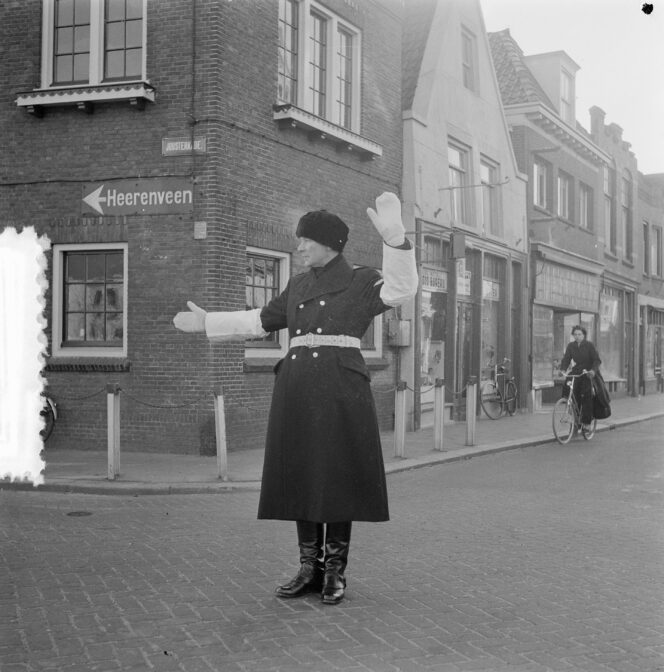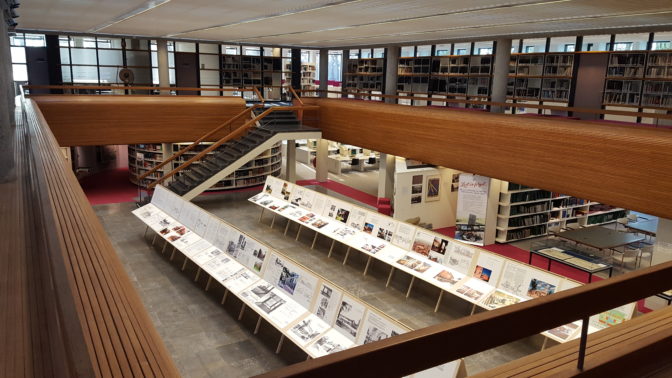Dutch privacy laws are strict and restrict access to recent records. Sometimes, it may be necessary to consult these records because you are researching a person who was born less than 100 years ago, or because you need your own or your families’ records for legal purposes. I have written an article on how to obtain certified copies of birth, marriage, and death records. This article will focus on accessing non-public records in a reading room.

Policeman directing traffic. Credits: J.D. Noske, collection Nationaal Archief (CC-0)
Why are records restricted?
There can be several reasons why access to the record is restricted:
- It includes information about living people
- It includes strategic information that must be kept secret, for example state secrets
- The records are too damaged or fragile to be consulted.
With fragile records, image copies (microfilm, scans) may be available. Otherwise, access may be restricted until the record can be restored at a future date,
This article focuses on the first reason, records that are restricted because they contain information about living people.
Is the record public yet?
As a rule of thumb, records that include people born less than 100 years ago are not public. These restrictions are usually applied to whole series, so even if the page that your ancestor is on or the file for your ancestor does not have people born less than 100 years ago, the register may still be restricted because other pages have more recently born people. You can check the finding aid or consult the archive to find out what the restrictions are.
How do you know that restricted records exist?
Restricted records typically don’t have online indexes so you won’t find them by searching for your ancestors’ names. They may be described in more general terms in the finding aids of archives, for example “personnel files” or “court records.” The finding aid will list any access restrictions. There may be research guides that explain about record groups available at the archives. For an example, see the article Finding collaborators in World War II, that discusses the Central Archives of Special Jurisdiction.
Are you able to get an exemption?
If the record is indeed restricted for privacy reasons, you may be able to get permission to view it. Archives can have slightly different rules, but most archives honor the following exemptions:
- You are researching for your own records.
- The person you are researching is providing consent and you can submit proof of the consent.
- The person you are researching was born more than 100 years ago.
- The person you are researching is deceased, and you can provide proof of death.
To get an exemption, contact the archive and provide the necessary proof. The archive may need to check for you if a record exists. That research is typically done for free since you are not allowed to do it yourself and the Dutch archive law allows anyone free access to records.
Viewing restricted records
Procedures differ between archives, but in general, viewing restricted records goes like this:
- You make an appointment to view the records
- You register at the archive and prove your identity (passport, ID)
- The archivist brings you the record for viewing.
- You view the record and take notes.
In general, you will not be allowed to make image copies. You may be asked to put your cell phone in a locker or cover the camera of your tablet or laptop. If you need image copies for legal purposes, see the article how to obtain certified copies of birth, marriage, and death records.

Reading room at Tresoar. Credits: Romaine, via Wikimedia Commons (CC-0)
Examples of restricted records
- Birth records of the past 100 years
- Marriage records of the past 75 years
- Death records of the past 50 years
- Population registers of the past 100 years
- Police and court records of the past 75 years
- Notarial records of the past 75 years
See also Sources for researching people in the 1900s for public sources you can use to research people born less than 100 years ago.

